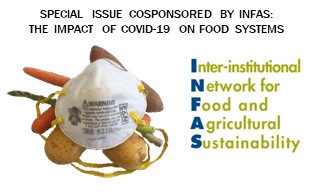An examination of adaptations of direct marketing channels and practices by Maryland fruit and vegetable farmers during the COVID-19 pandemic
DOI:
https://doi.org/10.5304/jafscd.2021.104.010
Keywords:
COVID-19, Local Food Systems, Resilience, Direct-to-Consumer (DTC), Marketing, Response Diversity, Adaptive Capacity, Stay-at-Home Order, PandemicAbstract
This study explores the impacts of the COVID-19 pandemic and the Maryland stay-at-home order on fruit and vegetable farmers in Maryland. Focusing on farms’ direct-to-consumer marketing channels, we aim to characterize the diversity of farm responses and identify practices that facilitated adaptation. This research is grounded in the socio-ecological systems framework, which emphasizes the interconnection between social and ecological systems and characterizes the dual-driving forces that impact food producers and their livelihood. The study team conducted interviews with 20 Maryland farm owners/managers who grow and sell produce. The semistructured interviews included questions relating to production practices, sales and marketing, and resilience. The interviewer followed up with probes to understand the dimensions of response diversity and adaptive capacity. Interviews were transcribed verbatim, and responses were analyzed using the framework approach. In the context of a global pandemic, community supported agriculture (CSA), farmers markets, and pick-your-own channels provided a high degree of stability and financial security. No farmer reported relying solely on intermediated markets (e.g., restaurants, grocery stores, institutions). Distribution channels that incorporated an online marketplace offering prepacked pre-orders were a notable strength of highly adaptive Maryland produce farmers. Farmers reported that expanding established CSAs was an important method for reallocating produce originally intended to be sold to reduced/terminated marketing channels. Common challenges among farmers included increased administrative workload, concerns associated with raising food prices during a crisis, and environmental concerns about the use of additional packaging. We describe a range of adaptive behaviors that aided farmers in withstanding shocks.
Metrics

Downloads
Published
How to Cite
Issue
Section
Categories
License
Copyright (c) 2021 The Authors

This work is licensed under a Creative Commons Attribution 4.0 International License.
The copyright to all content published in JAFSCD belongs to the author(s). It is licensed as CC BY 4.0. This license determines how you may reprint, copy, distribute, or otherwise share JAFSCD content.











